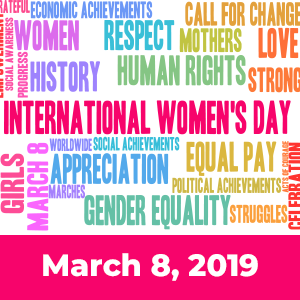March 8
On March 8, 2019, countries worldwide will celebrate International Women’s
Day (IWD). The first IWD was organized by a political group, the Socialist
Party of America, in the United States in 1909. Every year since then,
people observe March 8th as the day to revere the diverse
accomplishments of women everywhere.
Here are some ways to celebrate International Women’s Day with your
children:
- Watch Uplifting News Stories Together
Parents can share current news stories with their children in a way that is
respectful, honest and educational by watching them together. Within the
last year, young girls in the Washington, D.C. metropolitan area have made
the news for using their voices and talents in positive ways.Eleven-year-old Naomi Wadler, from Alexandria, VA, for example, spoke at
the March for Our lives rally in Washington, D.C. in March of 2018. Bella
Berrellez, also 11 years old and from Gaithersburg, MD, created an online
business in December of 2018, selling homemade sugar body scrubs as a way
to support her mother, who was deeply affected by the federal government
shutdown. In May of 2018, Mikayla Sharrieff, India Skinner and Bria Snell,
all juniors from a D.C. high school, were racially targeted after sharing
their inspiring water filtration project from a NASA contest, and ended up
winning second place in their category.It is not enough to tell our children “girls can do anything.” We need to
show them real-life examples of girls who have done great things to help
the community. The best value of sharing news stories is giving children
the opportunity to see girls and women in advertising become victorious in
the end. - Read Biographies of Famous Women
Women worldwide have truly fascinating and remarkable careers and lives.
The choices they have made – and their failures – are inspiring, as we
learn that these women achieved their dreams only after going through
serious setbacks. Pick one: Lucille Ball, Twyla Tharp, Mother Theresa,
Hillary Clinton, Harriet Tubman, J.K. Rowling, Cleopatra, Madonna, Jane
Goodall. Choose your own biography to read. Unearth the mysteries and
surprising challenges these women went through.Lucille Ball was told by her drama coach that she had no talent and that
she should not go into acting. J.K. Rowling purposefully chose two male pen
names to publish her books because she felt readers would never read them
if they knew they were written by a woman. Jane Goodall began her career as
a secretary, and was offered additional secretarial work despite her
passion and desire to work with apes in Africa. - Observe Women in Schools, Stores and Doctor’s Offices
This seems simple, but it’s also a quick reminder to get parents and their
children to put the phones away, go tech-free for a while and simply
observe their surroundings during everyday errands and social encounters.There are women working at our children’s schools. They are our teachers,
school assistants and administrators. Many are our school principals and
heads of educational boards! How can girls and women go into the
educational field? What degrees are needed? There are women in stores doing
many exciting roles, from entry positions to management. Is it possible to
start off in a small position and work your way up to leadership? There are
women doctors, surgeons and nurses all around us. Do you notice the
positive things these women do?Why not observe what women do and tell children about it? Observation is
free, easy and a fantastic way to teach children and spark their curiosity. - Research Women Who Invented and Contributed to Advancements in Society
Today, we have become too comfortable with modern conveniences; we tend to
take things for granted and show our frustration when they stop working.
Coffee makers, hair dryers, television sets, phones, computers and
important services such as indoor plumbing, HVAC systems and transportation
were all developed after extensive effort, sweat, struggle and progress.Women inventors abound in our history, but are overlooked. For almost 200
years, women were forced to work in mostly domestic and industrial roles,
in poor working conditions for less pay. Men received credit and
recognition even though the women did much of the groundwork for
accomplishments attributed to men. Over time, the tides have turned and
women have been noted for making important technological, engineering,
scientific and medical contributions to our society.Clara Barton, Patsy Sherman, Marie Skłodowska Curie, Sally Fox,
Lillian Gilbreth, Valentina Tereshkova, Rachel Carson, Beulah Louise Henry,
Stephanie Louise Kwolek and Rebecca Lee Crumpler are just a small sampling
of women who have invented things and become the first to do great things
in their respective fields. Take some time to research these women, print
out facts on those who interest you, share with your children and talk
about how exciting it must have been to do what these women did. - Ask Questions and Interact with Women Leaders
Being a leader requires the skill to know the best ways to interact with
people with equal parts inner strength, diplomacy and respect. It is no
easy feat! Not everyone is destined to be a leader, but we can all learn
from leaders.Women have had a difficult path getting to their positions of leadership,
because so many gender-specific issues affect women in ways that do not
affect men. For example, a woman who chooses to be a leader must balance a
family with work schedules, may choose to have a baby and take maternity
work leave, may be married or unmarried and may be judged harsher than her
male counterparts.Children see everything that is going on and they will likely form their
opinions of women leaders based on yours. Take care to present the
leadership qualities of women in respectful, educational ways. Highlight
the strengths, but discuss the difficulties thoughtfully. Give children the
opportunity to ask women leaders questions and interact with them, so that
they can recognize the qualities needed to become effective leaders.
To learn more about International Women’s Day, please visit:
un.org/en/events/womensday/index.shtml.

